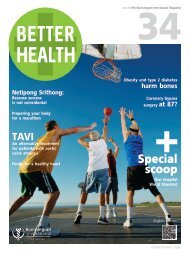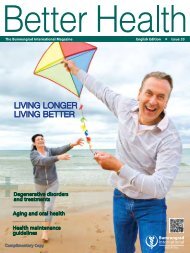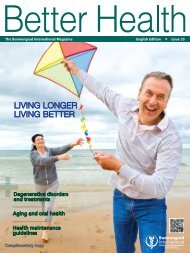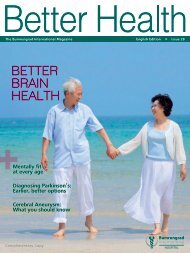Better Health 25 Eng
The magazine for patients and friends of Bumrungrad International Hospital, Thailand.
The magazine for patients and friends of Bumrungrad International Hospital, Thailand.
- TAGS
- bumrungrad
- hospital
- thailand
You also want an ePaper? Increase the reach of your titles
YUMPU automatically turns print PDFs into web optimized ePapers that Google loves.
the presence of certain diseases known to cause dementia.<br />
To ensure diagnostic accuracy, the doctor may conduct<br />
further tests; brain scans, neurological evaluations and<br />
neuropsychological tests are used to confirm whether or not<br />
the patient has dementia, and if so, whether it is reversible. <br />
“It is very important to identify the type of dementia and<br />
its underlying causes,” says Dr. Ketchai. “Doctors need to be<br />
sure to leave nothing out, so the patient won’t miss an opportunity<br />
to treat the diseases contributing to the dementia.” <br />
“By way of example, a relative brought their family<br />
member to see me about memory problems. After asking<br />
some questions, it was apparent that the patient was normal<br />
until the few days before we met, when suddenly he became<br />
unable to recognize family members. This didn’t match the<br />
profile of dementia caused by Alzheimer’s, but it fit the profile<br />
of secondary dementia caused by stroke. Based on that, by<br />
treating the stroke first, brain function might eventually return.”<br />
<br />
Leading cause: Alzheimer’s <br />
After ruling out other treatable causes, the next diagnostic<br />
step involves identifying the specific brain disorder causing<br />
the dementia, and then determining the best course of<br />
treatment such as medication. <br />
By far the most common cause of irreversible dementia<br />
is Alzheimer’s disease; it accounts for about 60 to 80 percent<br />
of all cases of dementia. Typically, symptoms of Alzheimer’s<br />
only become apparent around the age of 60 to 65. [Cases<br />
of earlier onset Alzheimer’s are rare and can usually be<br />
traced to gene mutations.]<br />
“Alzheimer’s disease is believed to be caused by the buildup<br />
of plaque in the brain which interferes with brain cell<br />
connections,” Dr. Ketchai explains. “The cells die or lose<br />
control over functions such as memory, perception, behavior,<br />
and cognitive and language skills.”<br />
Maintaining good brain health<br />
T<br />
hough some cases of dementia cannot be prevented, <br />
most people can reduce their dementia risk by <br />
incorporating these brain-healthy habits into their daily<br />
lifestyle:<br />
Maintain a healthy weight; obesity causes a number of <br />
chronic conditions that lead to dementia;<br />
Make brain-healthy food and supplement choices, <br />
including omega-3 in the form of DHA, which helps <br />
protect nerve cells; <br />
Be sure to get enough sleep every night;<br />
Stay socially active and keep contact with family<br />
and friends; <br />
Learn new things and do something different, e.g. <br />
practice using your other hand during meals; <br />
<br />
<br />
Do 30 minutes of aerobic exercise at least four times<br />
a week. <br />
Courtesy of Sallaya Kongsomboonvej, a US board-certified dietician<br />
at the Vitallife Wellness Center.<br />
“<br />
Earlier detection of Alzheimer’s <br />
disease and progressive dementia <br />
can slow disease progression<br />
while allowing patients and <br />
caregivers to maintain<br />
a better quality of life.”<br />
Dr. Ketchai Suavansri<br />
Alzheimer’s is a progressive disease categorized in<br />
three stages: <br />
Mild/Early stage Frequent recent memory loss,<br />
particularly involving recent conversations and events. <br />
Depression and apathy may occur and may be accom-<br />
panied by mood swings as patients start to notice their <br />
own symptoms. “At this first stage, the caregiver may <br />
not know how best to deal with the situation,” says<br />
Dr. Ketchai. “It’s fine to remind the patient once or twice <br />
if they forget something or their speech rambles on. But <br />
don’t pressure the patient to the point where they suffer <br />
stress which can lead to depression.” <br />
Moderate/Middle stage Symptoms have become more <br />
noticeable, making it impossible for the patient to cover <br />
up the problem. Patients may fail to recognize their <br />
spouse and family members. Mood and behavioral <br />
changes are usually seen. “At this stage, patients have <br />
become more dependent with everyday activities,”<br />
Dr. Ketchai notes. “Pay close attention to the patient’s <br />
safety; watch them when they go outside and restrict <br />
access to dangerous objects such as knives and fire <br />
sources.”<br />
Severe/Late stage Symptoms have worsened, with the <br />
patient gradually losing ability to remember, communicate,<br />
move around or care for himself. “The patient’s health <br />
continues to decline,” adds Dr. Ketchai. “The patient <br />
cannot be left alone.” Brain cell decline reaches extensive <br />
levels, causing grave damage to brain function. The <br />
patient’s condition continues weakening, putting them <br />
at serious risk for malnutrition and infections, some <br />
potentially fatal. <br />
<br />
Alzheimer’s disease remains incurable at the moment,<br />
and current treatments are only able to slow the speed of<br />
16
















